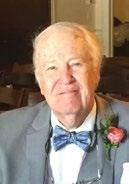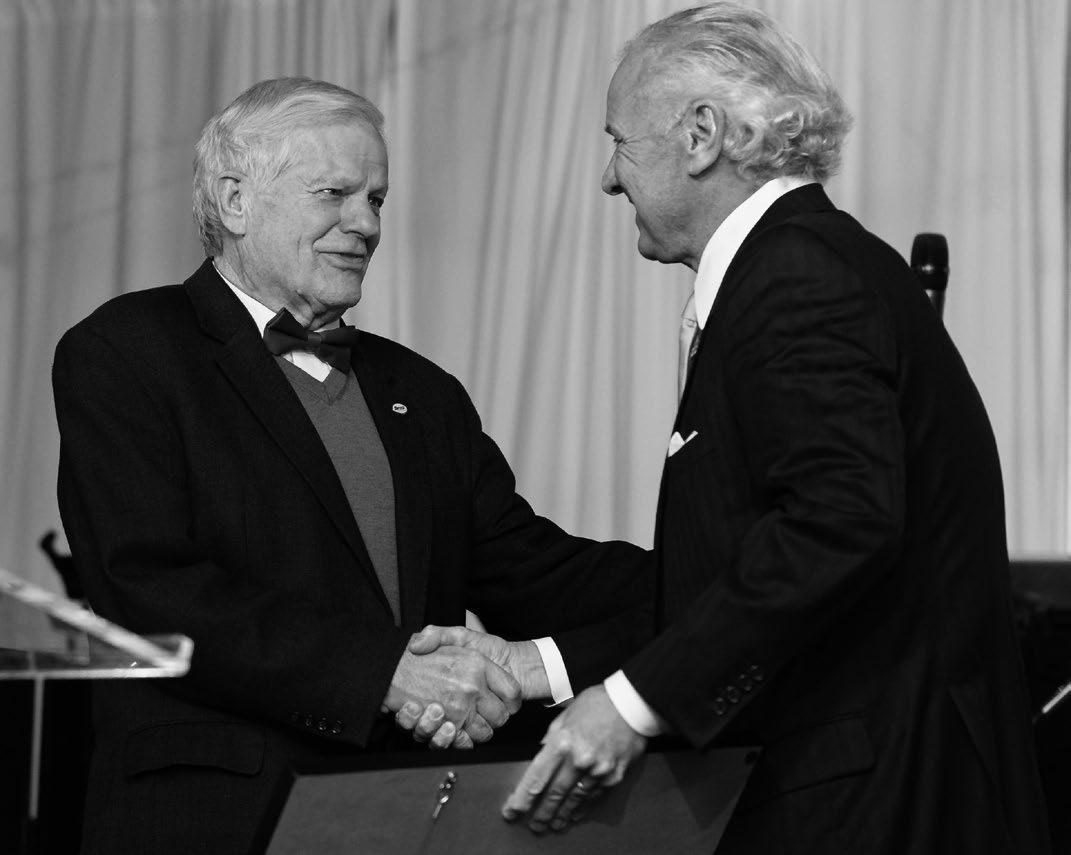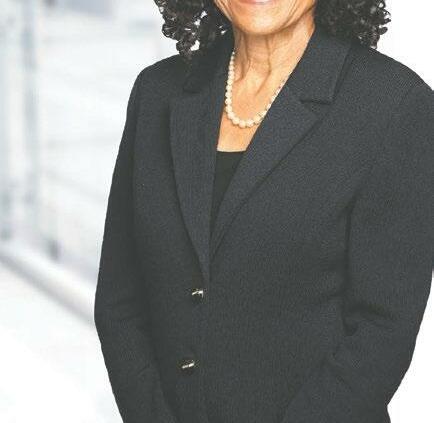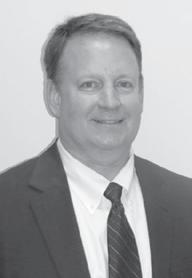South Carolina Lawyers Weekly founder dies
The founder of South Carolina Lawyers Weekly and Carolina Paralegal News has died.
David Blackwell, who was born in Blackwell, N.C., on Oct. 18, 1939, died Nov. 27, according to his obituary.
Blackwell graduated from Hargrave Military Academy and the University of Carolina at Chapel Hill where he walked on the baseball team and earned his Law Degree, the obituary stated.
During his working years, his career path spanned many professions: lawyer, legislator, Superior Court Clerk, and executive director and lobbyist for the North Carolina Academy of Trial Lawyers, according to the obituary.
Panthers owner settles tax fight over failed practice space
COLUMBIA, S.C. (AP) — The South Carolina county where Carolina Panthers owner David Tepper started building and then abandoned a new practice facility has reached a settlement over $21 million in sales tax money given to the NFL team.


Tepper will pay back the money, and York County agreed its dispute was totally resolved with both Tepper and his real estate company that handled the failed $800 million
project, according to a statement Wednesday night from the county.
The settlement came a week after the York County Sheriff’s Office and local prosecutor announced that Tepper and his company were under criminal investigation if the public money was misused.
Sheriff Kevin Tolson and Solicitor Kevin Brackett had no additional comment on whether the settlement changed the status of the investigation. But the statement from York
County officials left little doubt they felt the matter was resolved.
The county withdraws any suggestions Tepper and his GT Real Estate company violated the rules on spending the sales tax money, the settlement “is a full and satisfactory resolution of the county’s disputes,” and Tepper and his company “have acted in good faith,” the statement said.
He ultimately settled down as publisher of North Carolina Lawyers Weekly, the obituary stated. Under Blackwell’s leadership, three Lawyers Weekly publications were established: North Carolina Lawyers Weekly, South Carolina Lawyers Weekly and Carolina Paralegal News.
While at Lawyers Weekly, his office door was always open, and he made sure to visit each of his employees and friends every day, the obituary stated. He not only hired people for their ability, but for their personalities and interests. David was very loyal to employees, quick with praise, and accepted responsibility for any shortcomings, according to the obituary.
Blackwell loved music and had a great singing voice, the obituary stated. Oftentimes one could catch him singing for himself or his son. He especially loved bluegrass; some of his favorite artists were Doc Watson, Tony Rice, and Ricky Skaggs, according to the obituary.
He was married to Elizabeth (Beth) Crouch Blackwell, and had one son, David Michael Blackwell Jr. in 1987.
Blackwell is predeceased by his mother, father, brother and sisters. He is survived by his brother Curtis, wife Beth, son David, daughter in-law Gina, many nieces, nephews and his many friends he made over his professional career, the obituary stated.

A celebration of life will be held in Wilmington, N.C., at Saint James Parrish on Saturday, Jan. 14, at 11 a.m.
Donations can be made in honor of David to a Pawsitive Mission ℅ Pawsability, www.paws-ability.org.
To our readers,
As we move to a new year, I am thrilled to share our plan for a new digital-first South Carolina Lawyers Weekly.
The coverage you’ve come to trust and rely on will continue through an enhanced daily digital plan and a new, more focused, beautiful magazine we will deliver monthly starting in January.
We will be posting articles and breaking news on sclawyersweekly.com throughout the day to provide you the most current information about the issues you care about. And we will provide regular features you rely on throughout the week like our opinion summaries. They will be posted on our site each Thursday with a link to the full opinions after each summary.
With our new monthly magazine, our respected legal reporters will provide in-depth coverage on relevant legal topics as well as added features like a profile and Q&A with leading figures in the legal community.
Daily news and updates will continue to be available on our website and through email.
You won’t miss any of the legal news you’re accustomed to receiving. In fact, we’ve enhanced not only the delivery plan but our coverage.
Let me know what you think. We take seriously your continued trust in us as your legal news source. These changes, we believe, enhance coverage and delivery in keeping you informed.
Thank you.
Liz Irwin, Executive Vice President – Media BridgeTower Media
LAWYERS IN THE NEWS
Shumaker adds to staff, including SC
As reports show talent wars are threatening law firms, Shumaker has attracted and hired a dozen new attorneys to join its teams in Ohio, North Carolina, South Carolina, and Florida, a Shumaker news release stated.
“Despite stiff competition for legal talent, Shumaker is successfully recruiting some of the best and most promising attorneys in the nation,” said Tom Dillon, chairman of Shumaker’s Management Committee, in the release “This is a testament to the trusted Shumaker brand and reputation.”
“Our firm is experiencing new growth across several sectors, and we project demand for legal services to remain strong in 2023,” said Jennifer Compton, Vice Chair of Shumaker’s
Management Committee. “By adding to our team, we are ensuring our clients have access to top legal talent to help them grow their businesses.”
Shumaker made the following new hires in North Carolina and South Carolina:
Charlotte
Cameron Householder: Associate, Litigation and Disputes
Olivia C. Osburn: Associate, Health Law and Litigation and Disputes

Charleston
Kevin R. Horton, Associate, Health Law and Litigation and Disputes
In August, Shumaker hired Colleen Miller as Director of Associate Recruitment to lead firm-wide associate recruitment and retention initiatives.
“Having a team dedicated and solely focused on recruitment and retention efforts is critical for the success of a company,” Miller said in the release. “Hiring a dozen attorneys is exciting momentum that we’ll continue to
build upon in 2023.”
Founded in 1925, the Shumaker team of more than 300 lawyers and advisors is a provider of legal and legislative solutions. Shumaker has offices in Florida, Ohio, North Carolina, and South Carolina.
Attorney joins firm
as associate
Barnwell Whaley Patterson & Helms is delighted to announce that Brennan Ferguson has joined the firm as an associate. Her diverse practice comprises civil litigation, construction, insurance coverage and defense, and real estate.
“We are very excited to have Brennan join our team,” says Christopher M. Hinnant, a partner in the firm’s Wilm-

ington office. “Brennan’s litigation experience and diverse experience across multiple practice areas makes her an excellent addition and will allow us to better serve our existing clients and expand our client base.”
Before joining Barnwell Whaley, Ferguson focused her practice on creditor-debtor law, construction law, insurance defense, and other complex litigation matters. Ferguson has worked at highly regarded firms in both the Washington, D.C.area and Wilmington. She earned her law degree at the Appalachian School of Law and her Bachelor of Arts from the University of Tennessee-Knoxville. Licensed in Maryland and North Carolina, Ferguson is based in the firm’s Wilmington office.
Established in Charleston in 1938, Barnwell Whaley Patterson & Helms PLLC, advises businesses and professionals in North and South Carolina and throughout the United States in Federal Court.
McMaster looks to ban social media platform
South Carolina Gov. Henry McMaster recently took action to block access to the social media platform TikTok from all state government electronic devices managed by the South Carolina Department of Administration.

The governor made the request in a letter to South Carolina Department of Administration Executive Director Marcia Adams, according to a news release from the governor’s office.
“Protecting our State’s critical cyber infrastructure from foreign and domestic threats is key to ensuring the health, safety, and well-being of our citizens and businesses,” McMaster wrote in the letter, according to the release. “Federal law enforcement and national security officials have warned that TikTok poses a clear and present danger to its users, and a growing bi-partisan coalition in Congress is pushing to ban access to TikTok in the United States.”
The Department of Administration, a cabinet agency, uses shared services and centralization to help agencies efficiently and securely carry out common government functions, the release stated. Those efforts include, but are not limited to, internet services, managing mobile
The governor has long encouraged state agencies to partner with the Department of Administration to allow the state’s cyber infrastructure to be
maintained and managed in a comprehensive and cohesive fashion, the release stated.
In his letter to Adams, the governor requests an accounting of agencies not currently utilizing the shared services, the release stated: “Unfor-
tunately, there are a number of state agencies who continue to operate in a silo. I ask that you provide my office with a listing of state agencies for whom the department is unable to permanently block access to TikTok.” Staff report
Stewart Spinks, founder and chairman of the board of The Spinx Co., received the Order of the Palmetto at the company’s 50th Anniversary Celebration on Friday, Dec. 2 at Fluor Field in Greenville. The award was presented by Governor Henry McMaster.

The award has been given to valuable members of the community in South Carolina since 1971.





Spinks founded his business in 1972, and it since has grown to 82 convenience retail stores in the Carolinas.





















“I am truly speechless at this amazing honor,” Spinks said in a news release. “This means so much to me but would not be possible without the love and support from my family and also the Spinx family.”
Spinks has been inducted into the Convenience Store News Hall of Fame and named Individual Philanthropist of the Year along with his wife, Martha Spinks.









He also has received the American Cancer Society’s Susan Eison Award, is a Greenville Tech Foundation’s Workforce Development honoree, and a recipient of Greenville Tech’s Entrepreneur Award. He is also a Furman University Riley Institute Diversity Fellow and a recipient of the Boy ScoutBlue Ridge Council Outstanding Leadership Award.

Staff report

Assisted living facility resident settles for $2M after assault
■ BY HAVILAND STEWART hstewart@nclawyersweekly.comA resident of a South Carolina assisted living facility has settled for $2 million after being assaulted by a staffer.
In the spring of 2021, a resident at a South Carolina assisted living facility was physically assaulted by a staff member during a verbal disagreement.
The resident was evaluated at the hospital following the assault and released with generalized softtissue injuries. The plaintiff’s medical bills totaled at approximately $46,000. The resident attended several mental health counseling sessions to counteract the psychological traumas of this incident as well.
According to the plaintiff attorney, Rob Corney, there were some
Is this a verdict or a settlement? Pre-Suit Settlement
Type of case: Assisted Living Facility/Nursing Home Amount: $2,000,000.00
Injuries alleged: Minor soft-tissue bodily injuries and mental/psychological injuries
Case name: Confidential
Date of settlement: Finalized June 8, 2022
Special damages: Approximately $46,000 in total medical bills incurred Insurance carrier: Confidential Attorney(s) for plaintiff and their firm(s): Rob Corney and Dirk Derrick of the Derrick Law Firm in Conway, South Carolina Attorney(s) for defendant and their firm(s): Confidential Was the opposing represented by counsel? Yes
Were liability and/or damages contested? Yes Has the judgment been successfully collected? Yes
initial attempts by the assisted living facility to conceal this incident.
“This is just a sad situation that I think happens more often than then we even hear about,” Corney said. “Thankfully, there were some resident witnesses who brought it to the attention of the folks who needed to
know about it, and that was the only reason that this whole thing came to light in the end.”
This case settled pre-suit on June 8, 2022, for $2 million.
Many details of this case have been withheld due to a confidentiality agreement.
$22.5 million jury verdict makes history in Anderson County
■ BY HAVILAND STEWART hstewart@nclawyerswekly.comIn August, an Anderson Country, S.C., jury awarded plaintiff what is believed to be one of the largest jury verdicts in county history at $22.5 million for a moped wreck that took place in 2017.
According to the plaintiff’s council, Crystal H. Swinford, formerly with Poulin Willey Anastopoulo, the plaintiff was struck by the defendant from behind, causing the plaintiff to go over the top of the defendant’s vehicle. The plaintiff was then dragged behind the vehicle while the defendant was fleeing the scene of the collision.
The plaintiff suffered several severe injuries due to the accident including a broken jaw, neck, and back leading to paralysis. Aside from physical injuries, the plaintiff experienced a significant decrease in quality of life.
“He really is truly a wonderful indi-
Is this a verdict or a settlement? Jury verdict
Type of case: Motor vehicle wreck Amount: $22,500,000
Injuries alleged: TBI, Broken Jaw, Laceration to Throat, Broken Neck and Broken Back resulting in Paraplegia.
Case name: Max A. Jefferson v. Tyler Alexander Court: Anderson County Court of Common Pleas Case No.: 2020CP0400989 Judge: Judge Scott Sprouse Date of verdict: August 24, 2022 Bench or jury trial? Jury Trial Attorney(s) for plaintiff and their firm(s): Crystal H. Swinford, formerly with Poulin Willey Anastopoulo, LLC Attorney(s) for defendant and their firm(s): John Kirkman Moorhead,Moorhead LeFevre, PA
Were liability and/or damages contested? No. Has the judgment been successfully collected? No.
vidual, and unfortunately, he will require skilled nursing care for the rest of his life,” Swinford said. “One of the things that we asked the jury to consider is not what they were going to be giving him, but what he actually lost.” he client’s medical bills re-
sulting from the accident exceed $300,000. The verdict in this case is 1,125 times the pre-trial offer of $20,000.
Defense attorney J. Kirkman Moorhead with Moorhead LeFevre, PA, declined to comment.
Transportation tax to end in this South Carolina county
The Sales & Use Tax rate in Jasper County changes on Jan. 1, 2023, according to a news release from the South Carolina Department of Revenue.
Jasper County’s 1% Transportation Tax ends after Dec. 31, 2022. Beginning January 1, 2023, Jasper County businesses should stop collecting this tax.
The SCDOR is in the process of mailing a notice to Jasper County taxpayers to notify them of this change.
Because of this change, the Sales & Use Tax rate in Jasper County drops to 8% beginning January 1,
2023. Those paying an Accommodations Tax in Jasper County will pay 9%. The 8% includes the 6% state Sales Tax, a 1% Local Option Sales Tax, and a 1% tax for Jasper County schools.
The 1% Transportation Tax began on May 1, 2017. The goal of the tax was to raise $30 million before its termination on December 31, 2022, but the exact amount of collections will not be known until the first of the year.
For retailers
The SCDOR’s free online tax portal, MyDORWAY (mydorway. dor.sc.gov/_/), is the fastest and
easiest way for retailers to file returns and make payments to the SCDOR.
Jasper County’s new Sales Tax rate and all local tax changes are automatically updated when you file your Sales Tax return using MyDORWAY, to help ensure your return is accurate. Plus, automatic checkpoints help you avoid submitting an incomplete return.
If you have two or more locations, consider our Consolidated Sales Tax Return, which allows you to file for all of your locations at the same time.
Staff report
■ PUBLISHER Liz Irwin

lirwin@bridgetowermedia.com
■ INTERIM EDITOR
Jason Thomas jthomas@scbiznews.com
■ EDITORIAL
Haviland Stewart, Reporter hstewart@nclawyersweekly.com
Scott Baughman, Digital Media Manager sbaughman@mecktimes.com
■ ADVERTISING
Sheila Batie-Jones, Advertising Account Executive sbatie-jones@sclawyersweekly.com
■
ACCOUNTING & ADMINISTRATIVE
Michael McArthur, Business Manager mmcarthur@bridgetowermedia.com

■ CIRCULATION
Disa Ehrler, Audience Development Manager dehrler@bridgetowermedia.com
Circulation: 1-877-615-9536 service@bridgetowermedia.com
■ PRODUCTION & OPERATIONS
Bradley Redmond, Director of Production John Reno, Production Specialist
Corey Edwards, Production Specialist
©2022 BridgeTower Media.
Material published in South Carolina Lawyers Weekly is compiled at substantial expense and is for the sole and exclusive use of purchasers and subscribers. The material may not be republished, resold, recorded, or used in any manner, in whole or in part, without the publisher’s explicit consent. Any infringement will be subject to legal redress.
South Carolina Lawyers Weekly (USPS #020216) is published biweekly every other Monday with General Statewide Circulation by South Carolina Lawyers Weekly at 130 N. McDowell St. Unit B, Charlotte NC 282042411. (919) 829-9333, (800)-876-5297. Periodicals postage paid at Charlotte, NC 28228-9998. Subscriptions Rates: $369 per year.
Website: www.sclawyersweekly.com
POSTMASTER: Electronic Service Requested, send address changes to South Carolina Lawyers Weekly, Subscription Services, P.O. Box 1051 Williamsport, PA, 17703-9940 service@bridgetowermedia.com
South Carolina Lawyers Weekly is a publication of BridgeTower Media, 222 South Ninth Street, Suite 900, Minneapolis, MN 55402.
"Helping lawyers practice better, more efficiently, and more profitably."Rob D. Corney Crystal Swinford
New speaker will lead vastly different SC House
COLUMBIA, S.C. (AP) — Members of three South Carolina House were sworn into office recently with a new speaker serving his first full term and nearly a quarter of the representatives newly elected.

Speaker Murrell Smith was unanimously elected along with the other chamber leaders during a recent House organization session.
It gave the Republican from Sumter an opportunity to give his broad goals for a chamber that added seven Republicans, giving the party more than two-thirds of the House seats for the first time. In all, 27 of the chamber’s 124 representatives are new.
Smith reminded members of the state’s success over the past 30 years since Republicans first took over the chamber
“We are enjoying the feast of their labor” Smith said, adding much of that success came because Republicans talked to and worked with everyone.
The speaker’s Democratic seatmate — at least until he was chosen to stand at the front of the chamber — nominated him. Rep. David Weeks, also of Sumter, said Smith sees the importance of listening to all voices.
“While our votes may not always be the same, I know that we both deeply care for our constituents, for our beloved Sumter County and for our state,” Smith said. “I’m grateful here that people transcend politics.
Smith’s biggest challenge with 87 of 124 seats may come from his own party. A group of particularly conservative Republicans has created a Freedom Caucus that attacked other Republicans this year for not supporting a total abortion ban or other socially conservative positions.
One of the leaders of the caucus, Rep. RJ May of West Columbia, is a political consultant who helped run campaigns in the Republican primaries against sitting House members, irritating a number of his colleagues.
Republican Speaker Pro Tem
Tommy Pope of Rock Hill, a holdover from former House Speaker Jay Lucas’ leadership team, which emphasized kindness and congeniality, spoke about members who take pictures of the board where House votes are posted and the riled people up on social media.
“Are we here to combat each other, or are we here to represent the state?” Pope said.
Of the seven Democrats who lost their seats, five of them were African American women, a loss for the chamber noted by Rep. Gilda CobbHunter, a Black woman who is the chamber’s longest serving member at 32 years.


Cobb-Hunter’s seniority meant she got to open the session and she









PANTHERS / Panthers owner settles tax fight over failed practice space
Continued from 1 ►
“The county considers all matters related to the county payment closed and believes that no action of any kind with respect to the county payment is warranted,” the statement said.
GT Real Estate officials had no comment on the settlement Thursday, which must be approved by a federal judge overseeing the company’s bankruptcy case resulting from the abandoned practice facility project.
The sheriff and prosecutor last week were careful to say that the investigation does not mean that any crime happened.
“An investigation is simply an inquiry and should not create any inference that wrongdoing has been committed by any party,” their statement said.
Tepper, a hedge fund manager who is one of the NFL’s wealthiest owners, and the Panthers announced plans for an $800 million practice facility, team offices, sports medicine com-




plex, hotels and entertainment near Rock Hill in 2019.
Both local and South Carolina leaders cheered the investment, offering incentives and relishing getting a piece of the NFL team away from North Carolina and Charlotte, where the team plays its games about 25 miles (40 kilometers) away.
But after less than two years, Tepper’s company abruptly stopped work on the facility before its steel superstructure was finished, and declared bankruptcy. Work continues on an interstate interchange promised by the state, and Tepper’s company is trying to sell the land in the busy, growing region.
Tepper’s company blamed Rock Hill for failing to issue bonds and said the city and other governments failed to come through with funding and other promises.
Rock Hill, York County and contractors and other suppliers are all working on deals with Tepper’s company in federal bankruptcy court.
noted that there won’t just be voices missing in the chamber in 2023, but also in the long history of the House, which has no pictures of African American women on its walls.
“I have to say to those women, ‘You mattered,’” Cobb-Hunter said. “There


are some of us who will miss you and there is a void in this chamber.”
Also re-elected were House Clerk Charles Reid, House Reading Clerk James “Bubba” Cromer, SergeantAt-Arms Mitch Dorman and Chaplin Charles Seastrunk.
After serving as a federal judge for the U.S. District of South Carolina for over 20 years, I am pleased to share that I am now available to serve as a neutral for mediations and arbitrations.
I will also practice well as for counsel for investigations and equal opportunity or labor disputes.
To learn more, contact me at: (843) 724-7753 or mseymour@saxtonstump.com
Opinions
Criminal Practice
Murder – Jury Instruction – Malice Presumption – Harmless ErrorIn this case arising out of an armed robbery and murder, the trial court instructed the jury that it was permissible (but not required) to infer malice if the killing occurred during the commission of a felony. Even if this instruction erroneously emphasized a fact in evidence, any such error was harmless because the issue at trial was the identity of the shooter, not malice.
We affirm defendant’s convictions for murder, armed robbery and possession of a weapon during the commission of a violent crime.
The core dispute in this case was identity—whether the state could prove beyond a reasonable doubt that defendant was the masked man who shot the victim. The evidence was somewhat limited, including only the description from the victim’s friend who was in the victim’s apartment at the time of the incident (she said the shooter was short and Black), a neighbor’s identification of defendant, and phone records placing defendant’s phone near the scene. The defense focused on discrediting the neighbor by highlighting his inconsistent and false statements to police. It also argued the state was blaming defendant for the crime because defendant happened to be short.
The point is that nobody disputed the other aspects of this incident. Nobody argued the killing lacked malice. While the state always bears the burden of proving all elements of a crime beyond a reasonable doubt, we are not persuaded that an instruction about drawing an inference of malice had any bearing on a case where the undisputed evidence is that an unarmed victim was shot multiple times after he expressly disclaimed any intent to defend himself.
We need not go further to resolve this case, but as far as we can tell, this is the first case that has called on us to apply our supreme court’s “elevating a fact” cases to felony murder. Recent precedent has directed circuit courts to refrain from giving instructions that guide juries on the inferences they can draw from evidence or that tells the jury to consider particular evidence and how to construe it.
We may be mistaken, but we were not able to read Gore v. Leeke, 261 S.C. 308, 199 S.E.2d 755 (1973), together with Lowry v. State, 376 S.C. 499, 657 S.E.2d 760 (2008), and State v. Norris, 285 S.C. 86, 328 S.E.2d 339 (1985), overruled by State v. Belcher, 385 S.C. 597, 685 S.E.2d 802 (2009) (overruled on other grounds by State v. Burdette, 427 S.C. 490, 832 S.E.2d 575 (2019)), and reach a clear conclusion about how felony murder applies in South Carolina and what (if anything) a circuit court should charge with respect to that doctrine. If the per-
missive inference charge is invalid under the “elevating a fact” line of cases, we wonder what the circuit court can say about felony murder, if anything. This uncertainty is why we started with harmless error, for as we explained at the beginning, the parties in this case did not dispute malice, and there is no doubt the permissive inference charge did not contribute to this verdict.
Affirmed.
State v. Brown (Lawyers Weekly No. 011-071-22, 7 pp.) (Blake Hewitt, J.) Appealed from Greenville County Circuit Court (Edward Miller, J.) Lara Caudy for appellant; Alan McCrory Wilson, Donald Zelenka, Melody Brown, Julianna Battenfield and William Walter Wilkins for respondents. S.C. App.
Criminal Practice
Search & Seizure – Cell Site Data – Exigent Circumstances – Police Interview – Harmless Error
Even though the government will generally need a warrant to access cell site location information (CSLI), the exigent circumstances exception allowed police to use CSLI without a warrant here, just hours after a violent home invasion, because defendant was potentially armed and dangerous.
We find no prejudicial error in defendant’s convictions for first-degree burglary, kidnapping, armed robbery and illegal possession of a firearm.
Police Detective Jeremy Hembree testified it was not feasible to obtain a search warrant the morning of the investigation because the information gleaned from a warrant for historic cell records would not have provided defendant’s real-time location; however, he explained he later obtained a search warrant for the contents of defendant’s phone. Thus, this was not a standard criminal investigation seeking cell phone data; rather, this request sought to address an ongoing emergency because defendant was potentially armed and dangerous, had been involved in a violent crime only hours prior to the request, and left his co-conspirator for dead when he fled the scene.
Accordingly, the circuit court properly declined to exclude the video of defendant’s police interview on this basis.
Nevertheless, the trial court did err when it admitted the video into evidence without redacting hearsay, accusations that defendant was lying, and burden-shifting comments forbidden by State v. Brewer, 411 S.C. 401, 768 S.E.2d 656 (2015). However, this error was harmless beyond a reasonable doubt, given the other evidence against defendant.
A number of defendant’s co-conspirators testified as to the chronology of events leading up to the home invasion armed robbery. Additionally, Jasmine Hammond, de-
fendant’s girlfriend, testified that defendant told her he was involved in the home invasion as the driver of the vehicle and “the dude that was running it had got shot in the head.”
Patrick Neely, one of the coconspirators, testified extensively about defendant’s involvement in planning the robbery and admitted he gave defendant his gun to use that night. Melvin Chandler, the drug dealer who was the target of the home invasion (but who wasn’t present at the time) observed co-conspirator Rick Jackson being dropped off at his Columbia Avenue house in a gray or silver car, and defendant had borrowed a gray or silver rental car from Whitney Simpkins. Simpkins testified that Rodriquez Jackson, another co-conspirator, was with defendant when he picked up and dropped off the car.
ATF intelligence research specialist Regina Sailer’s cell phone maps—along with police Lieutenant William Cameron’s testimony explaining the historic cell phone records— corroborated Neely’s testimony about defendant’s whereabouts and the events leading up to the robbery.
Additionally, the state presented evidence that defendant urged several witnesses to change their statements prior to trial. In jail phone calls between defendant and Hammond, defendant asked Hammond to change her statement to corroborate his claim that he was in bed with her all night, despite the fact that Hammond spoke to two police officers at the scene outside the victim’s apartment, and defendant clearly was not with her.
Defendant also spoke on the phone with an unidentified female and asked her to tell the police that she saw him around 5:05 a.m. or 5:10 a.m., although he had previously asked her to tell police he was with her from 4:00 a.m. to 6:48 a.m. Defendant told the unidentified female to talk to Simpkins about changing her statement, saying, “you and her try to come up with a g****mn [inaudible] so she can tell them people something else instead of g*****mn that I came and picked her up.” Defendant elaborated, “Tell her to change her statement so her statement can’t be credible, you know what I’m saying?” Defendant said Simpkins needed to tell the police he came to pick her up, but he was alone, they never went to his cousin’s apartment, and someone else borrowed her rental car that night.
In light of the overwhelming evidence of defendant’s guilt, we find the circuit court’s admission of the unredacted interview video was harmless beyond a reasonable doubt.
Affirmed.
State v. Carter (Lawyers Weekly No. 011-072-22, 10 pp.) (Stephanie McDonald, J.) Appealed from Aiken County Circuit Court (Doyet Early, J.) David Alexander for appel-
lant;
Real Property
Tort/Negligence – Nuisance – Common Enemy – Slander of Title –Malice
Plaintiff’s nuisance claim is based on the defendant-trust’s installation of a driveway that allegedly directs stormwater runoff onto plaintiff’s property. The trial court properly found that (1) credible evidence showed that the driveway did not cause considerable amounts of stormwater to be cast onto plaintiff’s land; (2) when plaintiff rejected the trust’s proposal to construct the exact type of swale that she now asserts to be needed, the trust took adequate steps to route surface water to the other side of the trust’s land away from plaintiff’s land; and (3) plaintiff failed to prove that her property floods because of stormwater runoff from the trust property and not the result of her own property’s features: her property is 50 percent wetlands, constructed in a flood plan and with an art studio built around stilt foundations.
We affirm judgment for the trust on plaintiff’s claims of nuisance and slander of title.
Where Gordon Timmons was disclosed as a fact witness, he could testify about plaintiff’s refusal to allow the trust to cut down trees in order to install a swale, the installation of the driveway, and the re-grading of the driveway to direct stormwater away from plaintiff’s property. The admission of Timmons’ testimony was not inconsistent with the trial court’s exclusion of the expert testimony of contractor Mark Strong because Strong was not disclosed as a witness at all.
While it was error for the court to reference Strong’s excluded testimony in its analysis rejecting plaintiff’s nuisance claim, the error harmless. Plaintiff was not prejudiced by the court’s references to Strong’s proffered testimony in its factual findings because Strong’s testimony was cumulative to properly admitted testimony.
The record supports the court’s reasons for rejecting the testimony of David Franklin – the engineer and surveyor who created the site plan for plaintiff’s home in 2005 –as not credible, including Franklin’s role, possible bias, and errors surrounding the boundary dispute. Even though Franklin was qualified as an expert, this does not mean the trial court must give Franklin’s testimony more weight than the fact witnesses presented at trial.
Furthermore, the court did not misapprehend the common enemy rule and nuisance per se in finding plaintiff failed to establish her
claim. Under South Carolina law, occasional flooding may be enough to create a question of fact regarding whether a plaintiff has established a nuisance per se claim, as long as there is also evidence that the effects of the flooding are unreasonably dangerous at all times and under all circumstances to life, health, or property.
Plaintiff submitted enough evidence, even without Franklin’s testimony, to survive a directed verdict motion on the theory that the trust’s installation of the driveway created a nuisance per se on plaintiff’s property. However, this does not mean plaintiff ultimately wins the day on her claim or that the trial court “failed to consider” her evidence in finding she failed to prove her claim. The trial court must weigh the evidence and determine whether the ponding in plaintiff’s yard and the flooding of her studio reached the level of an actionable nuisance per se by the greater weight of the evidence.
After weighing the evidence, the court found she did not prove this claim, stating, “[S]urface water is a common enemy . . . Almost all of the testimony from [plaintiff] about water intrusion concerned a catastrophic hurricane or periods of massive rainfall . . . The house is constructed in a flood plain zone, and while there is conflicting evidence about whether she was permitted to construct her studio on the ground floor, the evidence shows that it is equally or more likely that she constructed the studio in a manner that subjected it to occasional flooding during large amount[s] of rain. It has not been proven that the construction on [the trust’s land] did anything to substantially enhance the frequency of surface water intrusion.”
The record supports this ruling, and we find no error. On this point, as with many others, the distinguished trial court’s order was eloquent, compelling, and correct.
Finally, in a prior action the trust claimed that it owned land on which plaintiff had built her home. The trust dismissed that action with prejudice; however, the trust then recorded a plat showing it had
LAWYER
quitclaimed the disputed property to plaintiff. Plaintiff’s slander of title claim is based on the plat, but her claim fails because she failed to show the trust acted with malice in recording the plat.
Affirmed.
Blank v. Timmons (Lawyers Weekly No. 012-031-22, 10 pp.) (Per Curiam) Appealed from Charleston County Circuit Court (William Keesley, J.) Edward Bertele for appellant; Mark Mason for respondent. S.C. App. Unpub.
Criminal Practice
Sentencing – § 3553(a) Factors – Plain Error – No Prejudice
Where the district court failed to identify which § 3553(a) factors it thought supported its sentence based on its independent assessment of the offense conduct and defendant’s history and characteristics, and where the court did not explain which of the parties’ arguments or documents persuaded it to impose a 151-month sentence, the district court plainly erred by failing to explain its reasons for imposing defendant’s custodial sentence. However, the district court imposed the bottom-of-the-Guidelines sentence that defendant requested. Accordingly, defendant cannot demonstrate that, absent the error, a different sentence might have ben imposed, and we conclude that his sentence is reasonable.
We affirm the district court’s judgment.
United States v. Smith (Lawyers Weekly No. 003-044-22, 6 pp.) (Per Curiam) No. 20-4388. Appealed from USDC at Columbia, S.C. (Mary Lewis, J.) Andrew Farley for appellant; Adair Boroughs for appellee. 4th Cir. Unpub.
Criminal Practice
ABHAN – State’s Theory of the Case –Self-Defense – Serious Bodily Harm
Even though there was no direct evidence supporting the state’s theory of the case – that defendant sucker punched the victim (Victim) in the back of the head – and even though the evidence seemed to point to defen-
dant having punched Victim in the face, there was nevertheless substantial evidence that defendant, a kick boxer, punched Victim and that this punch resulted in great bodily injury and ultimately Victim’s death.
We affirm defendant’s conviction for assault and battery of a high and aggravated nature (ABHAN).
At a nightclub, defendant’s friend, “Jimer,” inappropriately touched Victim’s girlfriend. The state’s evidence showed that defendant and Jimer talked and were parting amicably when defendant punched Victim. Victim fell to the floor “like a sack of potatoes.” Although there was no bruising to his face, Victim suffered hematomas to both the front and back of his brain. Despite undergoing surgery to relieve the swelling of his brain, Victim died.
Motion to Dismiss
The state’s expert, Dr. Joseph Cheatle, testified that, when one is struck in the head, a brain injury can occur at both the site of the blow and on the opposite side of the brain, i.e., a countercoup injury. Cheatle testified that Victim had suffered hematomas to both the back and the front of his brain. Cheatle explained that it appeared Victim had a force applied to the back of his head, but the front of his head on the exact opposite trajectory received the bleed.
On cross-examination, Cheatle admitted that the injury to the back of Victim’s head could have come from contact with a hard surface.
There is no direct evidence in the record supporting the state’s theory that defendant struck Victim in the back of the head. Even the state’s expert, Dr. Cheatle, conceded Victim’s injuries could have resulted from Victim’s head striking the floor after he fell. In fact, while the video surveillance and still photographs do not show defendant striking Victim, they do show Victim falling backward and landing with his feet pointed toward the ceiling. The video surveillance and still photographs also show two bouncers dragging Victim away from the dance floor towards the exit, dropping him at least once.


Nevertheless, considering the evidence in the light most favorable to the state, substantial circumstantial evidence exists that tended to show defendant punched Victim and this
punch resulted in great bodily injury and ultimately Victim’s death.
For purposes of the circuit court’s analysis at the directed verdict stage, it does not matter which story the jury would later choose to believe. The state’s theory— supported by the photograph of Victim’s face and Cheatle’s testimony as to the hematoma on the back of Victim’s head—was that Victim sustained a contrecoup injury as the result of a single blow which caused him to fall backward. The jury may have instead chosen to believe the version presented by the defense witnesses—that defendant punched Victim in the face with such force that he fell backward and sustained a contrecoup injury when his head struck the floor.
In either scenario, the blow proximately caused Victim’s injuries, which eventually resulted in his death. Accordingly, the circuit court properly denied defendant’s motion for a directed verdict.
Self-Defense
At trial, defendant objected to the self-defense instruction given by the trial court. He could not “imagine that our courts think that it is the law that a person that is assaulted with something less than deadly force, a fist, does not have a right to defend himself. . . . I do not think that can possibly be the law in self-defense in this state.” While this is certainly a question our appellate courts may need to address, and a concern that other states have tackled under appropriate circumstances, such circumstances do not exist here.
In this case, the circuit court provided a specialized and appropriate jury instruction in light of the evidence presented at trial. The circuit court charged the jury on the elements of self-defense, but then went further and added language instructing (1) defendant was entitled to act on appearances and (2) defendant was not required to wait for a person to be actually attacked before acting. Because the circuit court instructed the jury on the correct and current law of South Carolina based upon the evidence presented at trial, we find no error.
Affirmed.
State v. Guderyon (Lawyers Week-
•
•
•
•
ly No. 011-073-22, 15 pp.) (Stephanie McDonald, J.) Appealed from Horry County Circuit Court (Benjamin Culbertson, J.) Susan Barber Hackett for appellant; Alan McCrory Wilson, William Blitch and Jimmy Richardson for respondent. S.C. App.
Workers’ Compensation
Repetitive Motion Injury – Firefighter – Timely Reporting
Where the record shows that the claimant’s duties as a firefighter included lifting heavy objects on a regular basis, the claimant’s evidence showed a repetitive-motion injury to his back. It appears that the Workers’ Compensation Commission equated activities that are “repetitive” with activities that must be performed on a near constant basis to find that, because the claimant did not lift the same heavy object in the same way throughout each shift, he was unable to prove the admittedly “routine” and “frequent” lifting of heavy objects during his shifts as a firefighter were “repetitive” as required by S.C. Code Ann. § 42-1-172. Nothing in § 42-1172 demands such a narrow construction of the word “repetitive,” and this narrow construction goes against the
policy of the Worker’s Compensation Act, the plain meaning of the word “repetitive,” and South Carolina precedent.
We reverse the commission’s denial of the claim, and we remand for a calculation of benefits.
We also find the claimant (Claimant) presented competent medical evidence “that there is a direct causal relationship between the condition under which the work is performed and the injury.” § 42-1-172(D). Dr. Lindley was under no misapprehension about the duties Claimant was required to perform as a firefighter when giving his opinion about the cause of Claimant’s repetitive trauma injury, and it was his expert medical opinion that to a reasonable degree of medical certainty that Claimant’s repeated activity of picking up heavy objects and people caused Claimant’s L4-5 disc protrusion with radiculopathy, nerve impingement, and bowel and bladder issues. His expert medical was not “speculative” merely because Lindley did not distinguish among the repeated activities performed at Claimant’s job, the physical nature of his job, and the three incidents of significant pain detailed in Claimant’s Form 50 as the cause of Claimant’s injury. Lindley’s inability to pinpoint the injury’s onset is entirely consistent with a diagnosis of a repetitive trauma injury, which is defined by statute as an injury that “is gradual in onset and caused by the cumulative effects of repetitive trau-
matic events.” § 42-1-172(A).
To the extent Lindley equivocated in his deposition testimony, it was only when presented by the employer’s counsel with the legal artifice that he must independently investigate and corroborate Claimant’s patient history in order to form a competent opinion. This is “the classic fallacy known as the appeal to ignorance.” A medical expert may rely on a patient’s description of his job activities in determining whether the activities caused the repetitive trauma injury, and a medical expert does need to read an ergonomics report or independently investigate and corroborate a patient’s history in forming a competent opinion of the cause of a repetitive trauma injury.
The rejection of Lindley’s testimony on the basis that he could not rely on Claimant’s patient history in forming a competent opinion is error and demonstrates the commission has conflated its role of independent factfinder with the role of a medical expert providing an opinion as to what conditions cause a repetitive trauma injury.
The reasons Claimant was denied recovery were warped by the commission’s too narrow definition of the word “repetitive” and the commission’s improper rejection of expert medical testimony.
We also reject the commission’s conclusion that Claimant failed to timely report his injury. Back pain is
not the same as a back injury when evaluating the date a claimant reasonably should have known he has experienced a repetitive trauma injury.
Claimant, although experiencing and receiving treatment for back pain from 2014 until 2016, could not have reasonably known it was a compensable repetitive trauma injury until February 2017, when the pain from his gradual onset injury became so intense that he was unable to complete daily duties as a firefighter and he sought medical treatment from Dr. Cramer. Cramer diagnosed him with a significant injury and told him he would only be able to complete light duty work. The record is clear that Claimant reported this injury to Captain Reid within days of receiving this news from his doctor. Accordingly, the substantial evidence in the record does not support the commission’s finding that Claimant did not timely report his injury, and the ruling that Claimant is time-barred under S.C. Code Ann. § 42-15-20(C) from recovering compensation for his repetitive trauma injury is reversed.
Reversed and remanded.
Thompson v. Bluffton Township Fire District (Lawyers Weekly No. 012-032-22, 11 pp.) (Per Curiam) Appealed from the Workers’ Compensation Commission. David Holt Berry for appellant; David Alan Westerlund for respondent. S.C. App. Unpub.
United Airlines orders historic number of Dreamliners
■ BY JENNY PETERSON CorrespondentUnited Airlines has ordered 100 new Boeing 787 Dreamliners in a contract with an option to add 100 more — the largest widebody aircraft order by a U.S. carrier in commercial aviation history, according to the company.

This order will bring United Airlines total aircraft to roughly 700 new narrow and widebody passenger aircraft by 2032 to support its global fleet.
“Boeing is our largest exporter (with) high tech manufacturing jobs — the very kinds of jobs we are working hard to repatriate to the United States,” said Scott Kirby, chief executive officer at United Airlines.
Approximately 100 planes in the widebody order are expected to replace older Boeing 767 and Boeing 777 aircraft, with all 767 aircraft removed from the United fleet by 2030. United also exercised options to purchase 44 Boeing 737 MAX aircraft for delivery between 2024 and 2026. It ordered 56 more MAX aircraft for delivery between 2027 and 2028.
United expects to take delivery of the new widebody planes between 2024 and 2032 and can choose among the 787-8, -9 or -10 models, providing flexibility to support a wide range of routes.
Boeing’s Dreamliner program is based in North Charleston, which is one of two final assembly locations for the 787-8, -9 and -10.
Executives said the order will support United Airlines’ move in expanding its global fleet and adding more international flights, in line with the company’s United Next plan.
In the last two years, United added 13 new international destina-
tions, 40 new international routes and extra trips to 10 existing international routes.
The Boeing 787 Dreamliner promises a premium flight experience. More than 90% of the United Airlines international widebody planes already feature the United Polaris business class seat and big seats that turn into beds along with luxury blankets and pillows.
The new planes will be more fuel efficient with an expected 25% decrease in carbon emissions per seat for the new planes compared to the
older planes they are expected to replace. Kirby noted that supply chain issues have improved in the last six months, giving executives confidence that the Dreamliners will be delivered on or close to schedule.
“While the supply chain is challenged at both Boeing and Airbus — and we’re already a little bit behind on aircraft deliveries this year — we’re going to take delivery of an awful lot of airplanes in the next few years, even if some of them get pushed to the right a little bit,” said Kirby. “We’ve already taken into ac-
count some expected delays.”
The order is expected to lead to increased hiring at United Airlines. The Chicago-based company hired 15,000 people in 2022 and is on track to add another 15,000 next year.
The airline hired about 2,400 pilots and plans to add more than 2,500 pilots in 2023, with a goal to add 10,000 pilots in the next decade. United will hire more than 18,000 new flight attendants in the coming years with more than 4,000 expected to join the team in 2023.
